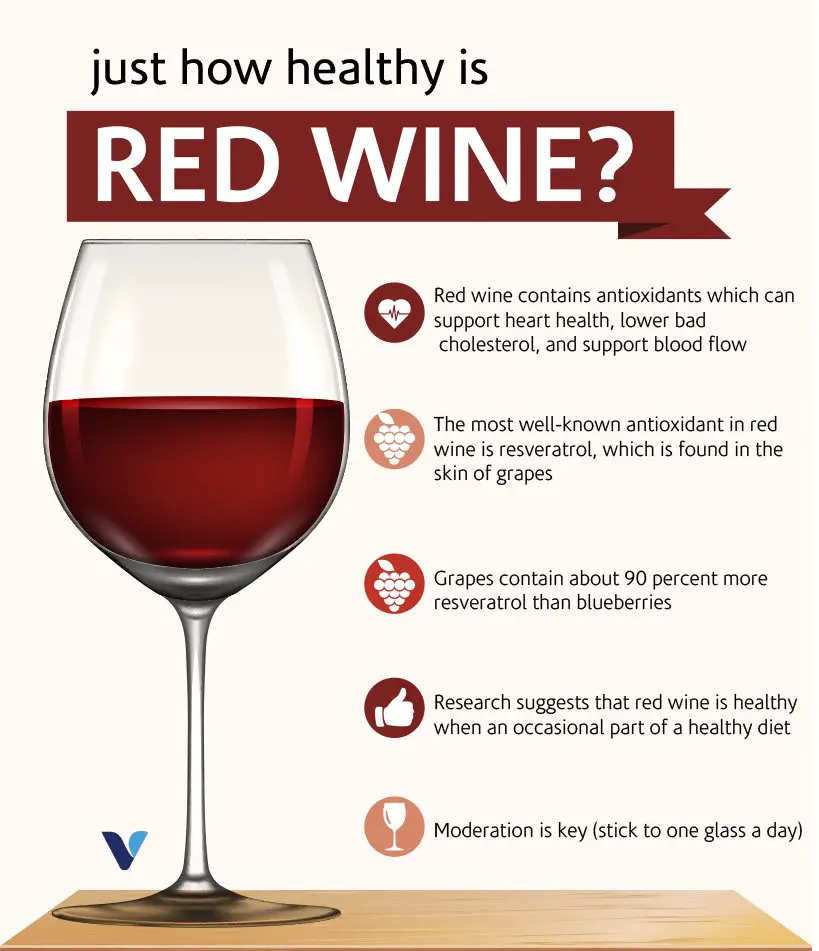What Is The French Paradox
The French Paradox;refers to the fact that the average French person has a much lower risk of heart disease, despite a diet that’s full of rich foods and saturated fats. And, as you might expect by its inclusion in this post,;a fair amount of wine.
Lots;of;different explanations;have been proposed to make sense of this paradox. We can’t entirely explain why the French diet is so healthy, unfortunately. The current thinking is there’s something about the French diet that protects the eater from some of the adverse side effects.;
One of those potential mitigating factors? Their aforementioned;;enjoyment of red wine.
That’s right the same biological effects we’re discussing might explain some of that French longevity, and their generally lower levels of heart disease, cancer, and obesity.
It Improves Your Gut Health
A healthy balance of bacteria in your intestinal tract is crucial for your gut health and helps with various body functions.;
They include food digestion, regulation of immune functioning, and helping with vitamin K production, which is mainly responsible for blood clotting .;
According to WebMD, red wine contains plant-based compounds known as polyphenols. They are defense chemicals that are naturally found in both fruits and vegetables . Since wine tends to be made from grapes, red wine tends to contain some traces of these compounds.
Polyphenols help in bringing about the balance of your intestinal bacteria, thereby improving your gut health . Polyphenols also contain antioxidants that tend to have numerous health properties and benefits.
Similarly, Medical News Today acknowledges that red wine also contains various compounds that act as prebiotics. Prebiotics help feeding healthy gut bacteria . It means that you can consume red wine to improve your gut health.;
However, before doing that, make sure you seek professional help from a doctor or dietitian. They might recommend other methods that work best depending on your health, needs, and individual factors.
Intense sweat sessions, working weight loss tips, lip-smacking recipes come in one package with the BetterMe app. And all of it is at your fingertips, start transforming your life now!
Red Wine: Good Or Bad
The health benefits of red wine have been debated for some time.
Many believe that a glass each day is a valuable part of a healthy diet, while others think wine is somewhat overrated.
Studies have repeatedly shown that moderate red wine consumption seems to lower the risk of several diseases, including heart disease.
However, there is a fine line between moderate and excessive intake.
This article takes a detailed look at red wine and its health effects.
Read Also: Lowest Calorie Wine Type
Is Sweet Red Wine Good For You: Heres What The Research Says
Wine consumption has been part of the human diet for centuries. However, in the last few decades, this practice has become quite common. More and more people are embracing the practice of drinking wine, and specifically, red wine. This has made most people curious about why there is a buzz with red wine.
Is sweet red wine good for you? This is the question most people who are following this new trend are asking. To answer this question, we will comprehensively discuss the benefits and downsides that come with red wine consumption. We will not stand behind existing claims but instead only state what is backed by science. Read on to discover if you should also join in on the trend of drinking red wine.
Red Wine Health Benefits: What You Need To Know

If you’re one of the many people who are fond of a glass of mulled wine at Christmas, this one’s for you.
While we all know that alcohol itself isn’t good for us, red wine is often cited as a ‘healthy’ exception. But is this just wishful thinking?
We’ve looked at the supposed health benefits of red wine and explored the potential health risks. We’ll also give you the answer to the key question – just how much red wine is it safe for you to drink?
Also Check: Wine Shipping To Louisiana
Can Prevent Dementia And Alzheimer’s Disease
The same anti-inflammatory properties that make red wine a good weight loss or antioxidant compound help stave off neurodegenerative disease as well!;
As usual, this study only applies to red wine enjoyed;in moderation, but;according to a 2004 study, an occasional glass of red wine was found to significantly reduce the risk of Alzheimer’s and other neurological degenerative diseases.
As mentioned above, red wine can help prevent ischemic stroke damage, and those same anti-inflammatory properties can help protect the brain against common aging diseases like Alzheimer’s and dementia. While too much drinking leads to its own memory problems, a glass enjoyed in moderation can help you build a healthy, flexible brain that will keep you feeling sharp and ready to go for years to come!
It Can Improve Your Cardiovascular Health
Cardiovascular diseases have become growing health concerns and are among the major causes of death globally. They include diseases such as coronary heart disease, which is the leading cause of death in America .
There is a belief that drinking a glass or two of red wine could reduce the risk of cardiovascular diseases. However, this is not always the case. You might be consuming one glass of red wine daily yet still report poor heart health.
Red wine can only improve your cardiovascular health if it is consumed in moderation and coupled with other healthy lifestyle changes . For example, you can improve your heart health if you eat healthy meals and then regulate your wine intake.
All this involves consuming high-fiber foods, plenty of fruits, whole grains, and vegetables . These are some of the foods that are known to keep your heart healthy. The trick is to, therefore, also consider implementing other healthy lifestyle changes that can boost your cardiovascular health.
Women are recommended to drink only a glass of red wine daily. The limit for men is two glasses of red wine a day .
You May Like: What Kind Of Wine Can Pregnant Women Drink
History Of Wine In Medicine
Early medicine was intimately tied with religion and the supernatural, with early practitioners often being priests and magicians. Wine’s close association with ritual made it a logical tool for these early medical practices. Tablets from Sumeria and papyri from Egypt dating to 2200 BC include recipes for wine based medicines, making wine the oldest documented human-made medicine.:433
Can Wine Ever Be Good For You
Im all for respecting wines risks. But lets not discard its soulful pleasures
When it comes to falling for the seductive self-delusion that tells us its possible to have our cake and eat it, wine drinkers have been second only to Brexiters. Not that you can blame us. The idea that wine is not a vice but a kind of hedonistic medicine has been hardwired in the culture since the emergence of the French paradox in the 1980s, which was widely presented in the press as a doctors free pass for gourmandising.
A French diet that was high in cheese, red meat and, crucially, daily draughts of red wine was, in the more sensationalised and optimistic accounts, not merely claimed to be safe; some argued it might be healthier than the abstinent alternative.
In the decades since, the idea that moderate wine consumption could be good for you has hardened into something like received wisdom. As the British Medical Journal put it, in summing up one of the largest studies of its kind by the department of public health and primary care at Cambridge University in 2017, involving almost two million British adults: Four decades of epidemiological studies have largely agreed that moderate drinkers experience lower rates of essentially every meaningful cardiovascular outcome except hemorrhagic stroke than those who dont drink at all.
Also Check: Does Aldi Sell Alcohol
Best Australian Red: Penfolds 2017 Bin 389 South Australia Cabernet Shiraz
Region: South Australia, Australia | ABV: 14.5%;| Tasting Notes: Black cherries, Cassis, New leather, Fruit cake
Penfolds, unquestionably the greatest winemaking estate in Australia, is best known for its iconic wine, Penfolds Grange. Chief winemaker Peter Gago made it his mission to produce well-structured wines with deep flavors and, as he puts it, a propensity to age.;
While Grange is primarily shiraz, with a splash of cabernet sauvignon sourced from specific sites in South Australia, Penfolds’ Bin 389 combines 54% cabernet sauvignon with 46% shiraz and is often referred to as Baby Grange. Plus, this wine comes at a more approachable price tag than the Grange.
Region: Mendoza, Argentina;| ABV: 14.5%;| Tasting Notes: Cherry compote, Salty dark chocolate, Cedar spice
Achaval-Ferrer’s Quimera blend is a wine of remarkable precision: Co-founder Santiago Achaval, one of the most respected winemakers in Argentina, and winemaker Roberto Cipresso comb the vineyards, tasting grapes and hand-selecting vines specifically for this blend. In 2014, they conceived a dynamic and complex blend of 50% malbec, 24% cabernet franc, 18% merlot and 8% cabernet sauvignon.
Region: Ribera del Duero, Spain | ABV: 14% | Tasting Notes: Spiced plums, Forest underbrush, Cigar box
Good to Know:
Boost Your Bodies Defences
According to a Spanish study, as little as half a glass of red wine may guard against food poisoning caused by germs like salmonella when people are exposed to contaminated food.
In one British study, people who drank roughly a glass of wine a day reduced their risk of infection by Helicobacter pylori bacteria, a major cause of gastritis, ulcers, and stomach cancers by 11%.
Read Also: What Kind Of Wine Is Stella Rosa
Risks Of Drinking Red Wine
It is best to consume small amounts of red wine. Drinking too much red wine poses similar risks to overconsuming other types of alcohol. Research has shown that individuals who over consume alcohol are at a higher risk for liver disease, certain cancers, hypertension, and heart disease. More short-term consequences include sleep disturbances and issues with detoxification, says Feller.
As with any other alcohol, there are risks associated with consuming too much wine. Each year in the US, excessive alcohol use led to 95,000 deaths. Over a lifetime, excessive alcohol use can lead to the development of high blood pressure, heart disease, liver disease, colon cancer, breast cancer, throat cancer, a weakened immune system, plus a range of social problems including employment instability and impacted family relationships.
Thanks To Guest Blogger Mark Davis For This Post

Whether red wine has any prominent health benefit is still a debatable issue. However, studies have shown that consuming a moderate amount of red wine, which has an alcohol content of 12% -15% on a daily basis helps in the prevention of a number of diseases including heart disease.
It should be remembered that there is a fine line of difference between moderate and excessive. Too much consumption of wine can be detrimental to health. On the other hand, too little of it would not give you the benefits usually enjoyed by the moderate drinkers.
Don’t Miss: How To Get Red Wine Out Of Tablecloth
Is Wine Good For You
Are there health benefits to drinking wine? Our guide sorts out facts from wishful thinking. We also have a handy quiz to help you tot up the calorie count of wine and other alcoholic drinks…
While excessive and binge drinking is best avoided,;moderate drinking can have some;benefits for heart health;for certain individuals. However,;sorting out fact from wishful thinking isnt easy. We look at the facts and fiction surrounding alcohol consumption.
French Paradox And The Benefits Of Consumption
The 1990s and early 21st century saw a renewed interest in the health benefits of wine, ushered in by increasing research suggesting that moderate wine drinkers have lower mortality rates than heavy drinkers or teetotalers.:341â2In November 1991, the U.S. news program 60 Minutes aired a broadcast on the so-called “French Paradox“. Featuring the research work of Bordeaux scientist Serge Renaud, the broadcast dealt with the seemingly paradoxical relationship between the high fat/high dairy diets of French people and the low occurrence of cardiovascular disease among them. The broadcast drew parallels to the American and British diets which also contained high levels of fat and dairy but which featured high incidences of heart disease. One of the theories proposed by Renaud in the broadcast was that moderate consumption of red wine was a risk-reducing factor for the French and that wine could have more positive health benefits yet to be studied. Following the 60 Minutes broadcast, sales of red wine in the United States jumped 44% over previous years.
Read Also: Is Stella Rosa Wine Keto Friendly
You Might Have Poorer Sleep Quality
Many people might feel like a nightly glass of wine helps them fall sleep more easily. However, drinking alcohol before bed is associated with more slow-wave sleep patterns, known as delta activitya deep sleep that allows for memory formation and learningaccording to the National Sleep Foundation. During this time, alpha activity, which is another type of brain pattern, is also turned on. Alpha and delta activity in the brain together may inhibit restorative sleep.
It Can Help Fight Against Cardiovascular Disease
Whether or not red wine can help with heart health is a common discussion among health experts and wine lovers alike. Overall, research shows that moderate intake of red wine does, in fact, have some cardiovascular benefits.
In a study done by the Canadian Journal of Clinical Nutrition, results found that the polyphenols found in red wine that we discussed earlier also have numerous benefits on coronary blood flow and heart health. Polyphenols are proven to have “vaso-relaxing effects on the coronary microvessels,” which in other words, means the natural chemicals found in red wine can help relax our blood vessels, aiding in the prevention of blood clots and other cardiovascular issues.
Red wine also raises levels of lipoproteins , also known as “good cholesterol.”;And according to Harvard School of Public Health, higher levels of HDLs are often correlated to a better chance of protecting yourself against cardiovascular disease.
Read Also: How To Get Red Wine Out Of Tablecloth
Red Wine Vs White Wine
The difference between red wine and white wine is red wine is fermented with the grape seeds and skin.;
Leaving seeds and skins in wine while it ferments affects the color, but it also affects the composition of win. Most interestingly, red wines are richer in tannins and byproducts such as resveratrol than white wines
From what we know today, red wines tend to have more health-promoting effects than white wines.;White wine does seem;to have positive effects as well, but white wines also have a tendency to accumulate more toxic byproducts during fermentation;such as acetaldehyde.;
Potential Health Risks Of Red Wine Vinegar
When it comes to vinegar, there can be too much of a good thing. The following red wine vinegar health risks vary and can potentially be serious:
A study in Serbia found that high levels of vinegar in the diet may be linked to a higher risk of bladder cancer. The study was based on a review of 130 patients who were newly diagnosed with this type of cancer.
Recommended Reading: Red Wine With Least Calories
Red Wine May Improve Cardiovascular Health
The cardiovascular benefits of red wine are due to the beverage’s abundance of polyphenols, which are a type of antioxidant;found in the skin and seeds of grapes.;;
In fact, a glass of red wine has about 10 times more polyphenols than a glass of white wine. According to Roberta Anding, a registered dietitian at Baylor College of Medicine, the types of polyphenols in red wine include:
- Resveratrol
- Anthocyanin
;While all of these are beneficial, Anding says the most favorable is resveratrol, which is considered to be the most effective wine compound for preventing heart disease due to its anti-inflammatory and antioxidant properties.;
These antioxidants prevent heart problems in multiple ways. According to Mayo Clinic, the compounds in red wine can increase levels of good cholesterol and lower levels of bad cholesterol, which can be heart healthy. Additionally, polyphenols are believed to protect the blood vessels’ lining in your heart.;
Adopt The Habit Of Drinking A Glass Of Wine

If drinking red wine wasnt a part of your diet, its a good idea to add it. Many people start drinking wine to enjoy the flavors it brings. Luckily, there is a large selection of wines to suit any taste. Try them and find the ones you like the most.
Another option is to eat a dessert that uses wine as an ingredient. This will help you reduce the amount of the wine flavor you taste. But, you still get all of the benefits.
Finally, just be sure that you dont eat too much sugar and remember that moderation is key!
Cheers!
Don’t Miss: Where Can I Buy Troublemaker Wine
It Can Improve Cognitive Functioning
The resveratrol and other antioxidants in red wine are known for being good for your brain. They can help balance your bodys inflammatory processes and;reduce your risk of arterial hardening, which can be great for;proper oxygenation of the brain.
A small glass a day is known to be enough to decrease the risks of getting;dementia and brain tissue from wearing down prematurely.;
